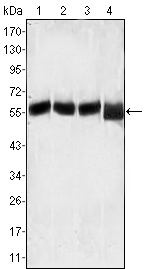Lck Monoclonal Antibody
- Catalog No.:YM0413
- Applications:WB;ELISA
- Reactivity:Human
- Target:
- Lck
- Fields:
- >>NF-kappa B signaling pathway;>>Osteoclast differentiation;>>Natural killer cell mediated cytotoxicity;>>Th1 and Th2 cell differentiation;>>Th17 cell differentiation;>>T cell receptor signaling pathway;>>Yersinia infection;>>Human T-cell leukemia virus 1 infection;>>PD-L1 expression and PD-1 checkpoint pathway in cancer;>>Primary immunodeficiency
- Gene Name:
- LCK
- Protein Name:
- Tyrosine-protein kinase Lck
- Human Gene Id:
- 3932
- Human Swiss Prot No:
- P06239
- Mouse Swiss Prot No:
- P06240
- Immunogen:
- Purified recombinant fragment of human Lck expressed in E. Coli.
- Specificity:
- Lck Monoclonal Antibody detects endogenous levels of Lck protein.
- Formulation:
- Liquid in PBS containing 50% glycerol, 0.5% BSA and 0.02% sodium azide.
- Source:
- Monoclonal, Mouse
- Dilution:
- WB 1:500 - 1:2000. ELISA: 1:10000. Not yet tested in other applications.
- Purification:
- Affinity purification
- Storage Stability:
- -15°C to -25°C/1 year(Do not lower than -25°C)
- Other Name:
- LCK;Tyrosine-protein kinase Lck;Leukocyte C-terminal Src kinase;LSK;Lymphocyte cell-specific protein-tyrosine kinase;Protein YT16;Proto-oncogene Lck;T cell-specific protein-tyrosine kinase;p56-LCK
- Molecular Weight(Da):
- 58kD
- References:
- 1. Mingjian Shi, John C. Cooper, Chao-Lan Yu. Mol. Cancer Res., Jan 2006; 4: 39–45
2. Robert F. Stachlewitz, Michelle A. Hart, Brian Bettencourt. J. Pharmacol. Exp. Ther., Oct 2005; 315: 36–41.
- Background:
- This gene is a member of the Src family of protein tyrosine kinases (PTKs). The encoded protein is a key signaling molecule in the selection and maturation of developing T-cells. It contains N-terminal sites for myristylation and palmitylation, a PTK domain, and SH2 and SH3 domains which are involved in mediating protein-protein interactions with phosphotyrosine-containing and proline-rich motifs, respectively. The protein localizes to the plasma membrane and pericentrosomal vesicles, and binds to cell surface receptors, including CD4 and CD8, and other signaling molecules. Multiple alternatively spliced variants encoding different isoforms have been described. [provided by RefSeq, Aug 2016],
- Function:
- catalytic activity:ATP + a [protein]-L-tyrosine = ADP + a [protein]-L-tyrosine phosphate.,disease:A chromosomal aberration involving LCK is found in leukemias. Translocation t(1;7)(p34;q34) with TCRB.,domain:The SH2 domain mediates interaction with SQSTM1. Interaction is regulated by Ser-59 phosphorylation.,enzyme regulation:Inhibited by tyrosine phosphorylation.,function:Tyrosine kinase that plays an essential role for the selection and maturation of developing T-cell in the thymus and in mature T-cell function. Is constitutively associated with the cytoplasmic portions of the CD4 and CD8 surface receptors and plays a key role in T-cell antigen receptor(TCR)-linked signal transduction pathways. Association of the TCR with a peptide antigen-bound MHC complex facilitates the interaction of CD4 and CD8 with MHC class II and class I molecules, respectively, and thereby recruits the associat
- Subcellular Location:
- Cell membrane ; Lipid-anchor ; Cytoplasmic side . Cytoplasm, cytosol . Present in lipid rafts in an inactive form. .
- Expression:
- Expressed specifically in lymphoid cells.
- June 19-2018
- WESTERN IMMUNOBLOTTING PROTOCOL
- June 19-2018
- IMMUNOHISTOCHEMISTRY-PARAFFIN PROTOCOL
- June 19-2018
- IMMUNOFLUORESCENCE PROTOCOL
- September 08-2020
- FLOW-CYTOMEYRT-PROTOCOL
- May 20-2022
- Cell-Based ELISA│解您多样本WB检测之困扰
- July 13-2018
- CELL-BASED-ELISA-PROTOCOL-FOR-ACETYL-PROTEIN
- July 13-2018
- CELL-BASED-ELISA-PROTOCOL-FOR-PHOSPHO-PROTEIN
- July 13-2018
- Antibody-FAQs
- Products Images

- Western Blot analysis using Lck Monoclonal Antibody against MOLT-4 (1), CCRF-CEM (2), CCRF-HSB-2 (3) and Jurkat (4) cell lysate.



